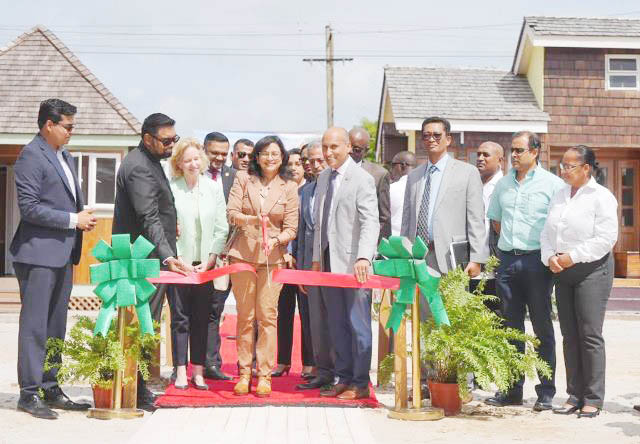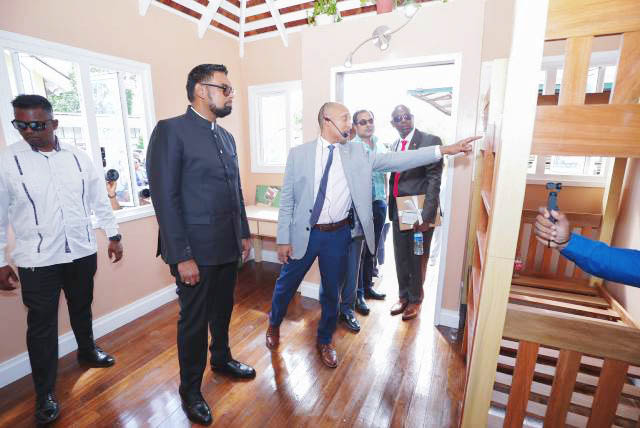As he joined in the opening of DuraVilla Homes, the launch of a 1,000-plus modular homes project, President Irfaan Ali yesterday stated that the export of prefabricated homes has the potential to become a major foreign exchange earner for Guyana.
“The housing market is now positioning itself as an export industry. Housing exports can become a major foreign exchange earner for Guyana… enhancing Guyana’s reputation as a reliable and qualified supplier of prefabricated housing,” Ali underscored as he committed his government’s support to the expansion of the sector.
Ali, while addressing the gathering at the DuraVilla, Land of Canaan manufacturing site, said the housing market presents huge opportunities for economic spin off beyond the shores of Guyana.

As he expanded on government’s commitment to the expansion of the market, the Head of State announced an Amazonia-styled luxury housing development for young professionals. Though he did not give a location for the development, Ali disclosed that government will construct 50 homes made from premium quality wood.
“We intend to work on a project of 50 homes, all wooden, going back to our colonial-style heritage, mixed with modern architecture. It is the first completely green, eco-friendly, resort-style luxury housing,” he explained, adding, “This is another initiative which we will promote in the niche market of luxury. Wood is not cheap. Sometimes we have an illusion that wood is for the poor. We will make wood affordable in Guyana.”
Ali said that the Housing Ministers Collin Croal and Susan Rodrigues will be leading the project, which is scheduled to kick off in three months.
Speaking at the launch, Chief Executive Officer of DuraVilla Homes, Rafeek Khan, yesterday explained that the modern timber house initiative has been a vision of his since 2009.
“This is a God-size vision not man size vision… the housing demand in the region and even right here in Guyana is a God-size vision,” an emotional Khan said as he noted he had to overcome many obstacles. Khan, a year ago, at the International Energy Conference, showcased his model home and caught the attention of Barbadian Prime Minister Mia Mottley. It was from there negotiations began between him and government to get the project rolling.
The CEO disclosed that he has since received orders for 100 homes from Barbados and 50 homes from St. Vincent and the Grenadines. Currently the Grenadian Minister of Social and Community Development, Housing and Gender Affairs, Phillip Telesford, is leading a team here to scout out housing options.
As he addressed the gathering, Khan announced plans for the opening of two new manufacturing sites to meet the demand for its 1,000 homes initiative. Khan said the new manufacturing sites will be set up at Diamond, East Bank Demerara, and Annai, North Rupununi. The sites will complement the two others at Yarrowkabra, Linden-Soesdyke Highway and Land of Canaan, East Bank Demerara.
At present they are able to produce one house per day, Khan said, but with the aim of producing four homes in a day to meet demand, the new manufacturing sites will see a major push in production.
He explained that the value chain presents the opportunity to double the growth of forestry exports up to an estimated US$60 million.
“We could double Guyana’s exports by the time we close this year,” Khan enthused as he said that only US$34.5 million was earned from forestry exports at the end of 2022.
Ali told the gathering that since returning to government, they have incentivized the industry to encourage people to return to the sector. He noted that companies that have been on the brink of shutting down are now springing up back as a result of those measures.
The president said that the prefabricated housing market is full of potential. “We intend to give every support to the expansion of this vision and the expansion of this market in the Caribbean Community (CARICOM).”
On this note, he issued the call for the value added products from the forestry sector to be the preferred choice for the Latin America and Caribbean markets, which have a great need for decent housing.
“Our production system must be built for Latin America and the Caribbean… Our plywood must be the preferred plywood in all of CARICOM to begin with. We have to ramp up production to get there.”
The Head of State added that in order for Guyana to stay on top of the market, manufacturers must position themselves to be the go-to source. He said that should any disaster strike and homes are needed, Guyana must be able to supply those needs in a matter of days.
“That is where we have to position ourselves with speed and efficiency ready for deployment. That is how we have to take on this industry.”
Khan in his address expressed gratitude to the Barbadian government for believing in him and supporting his vision. He stated that during the procurement, the government was kind enough to offer an upfront percentage to construct the homes. This, he said, was a great deal since financial institutions were holding back on offering a line of credit to his business despite his years in the industry and an income of US$200,000 per month. The Guyana Bank of Trade and Industry has however agreed to offer a US$1.5 million line of credit.
In a previous interview, Khan had told this newspaper that his company will be constructing 600 square-foot two-bedroom houses, outfitted with photovoltaic energy generating panels. They would be valued at 100,000 Barbados dollars.
Khan said the company has modified the design of homes to meet the requirements of the Barbados people and to ensure they are safe and suitable even during the hurricane season. The homes have been retrofitted to feature higher pitched roofs, shorter overhangs, tied columns and other technical elements to ensure they are grounded in the event of a storm.
When the homes are shipped and assembled on the island, the workers in Barbados will be responsible for electrical and plumbing installations as well as that of security features, such as metal shutters, louvers and burglary prevention bars.






